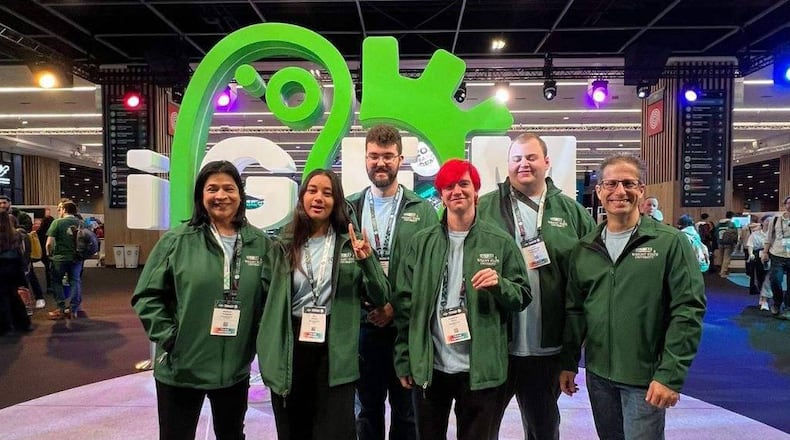Talk about being prophetic.
When Jaidan Peters, who has since graduated, was quoted in a story last year about the silver medal Wright State University’s synthetic biology research team won in an international competition, little did he know that the 2023 team would make that goal come true.
Wright State’s International Genetically Engineered Machine (iGEM) team earned a gold medal at the competition in Paris in November, after its silver medal in 2022 and bronze medal in 2021.
The event is the iGEM Jamboree, an annual global synthetic biology competition for young researchers in science, technology, engineering and math.
“It is the largest synthetic biology global competition with approximately 5,000 attendees from 66 countries and 400-plus teams that competed this year,” said Madhavi Kadakia, Ph.D., vice provost for research and innovation at Wright State, who accompanied those on the team to Paris.
In addition to the gold medal, the team received nominations for two special awards: Best Environmental Project and Best Hardware.
“Building on our past achievements of a bronze medal in 2021 and a silver in 2022, the students have excelled themselves, showcasing Wright State with exceptional distinction at this prestigious event,” Kadakia said. “I am proud of their accomplishments.”
Kadakia secured three years of funding from the Air Force Research Laboratory for the project — reflecting their commitment to cultivating talent in this sector by supporting the students, mentors and participation in the iGEM competition.
“This year we assembled a diverse, multidisciplinary team of undergraduate students from four distinct colleges to collaborate on the project,” Kadakia said. “This is a true example of participation among colleges — learning how to work together.”
Faculty from the Dayton and Lake campuses mentored and advised the students.
In addition to Kadakia, the team’s mentors are Michael Craig, Ph.D., research associate professor of biochemistry and molecular biology; Kayleigh Duncan, instructor of computer science; Stephen Jacquemin, Ph.D., professor of biology at Lake Campus; Weiwen Long, Ph.D., associate professor of biochemistry and molecular biology; and Ahsan Mian, Ph.D., professor of mechanical and materials engineering. Other mentors are from the Air Force Research Laboratory and community partners.
The gold-winning project continued last year’s silver-earning project to develop a sensor to detect manganese in water samples. High manganese levels in water are associated with neurologic dysfunction and Parkinson’s-like disease.
Alex Stone, a senior biomedical engineering major from Piqua, said this year’s project differed from last year’s in a key way. Stone said last year the team created a sensor for manganese by using live E. coli bacteria. This year the team did not use living bacteria, making the process safer.
The goal is to develop a process that can be used in the field instead of solely in a lab.
Zach Kronenberger, a biochemistry and molecular biology major from Fletcher, Ohio, developed a device to collect information from water samples. The 3-D-printed box uses an iPhone to take a photo of water samples that will show through luminescence if the sample has an unhealthy level of manganese.
“It’s meant for people to take test samples in the field to test for concentrations of manganese,” said Kronenberger.
The team’s overall experience was golden.
“The competition was wonderful,” Stone said. “Getting to hear the others talking about their projects, seeing what they were doing, was exciting.”
Kronenberger reflected on what this year’s success means.
“There were teams from all around the world,” he said, “and this school from Ohio got the gold.”
“It was a big win for the students and for Wright State,” Kadakia said. “When people see us doing these projects, it attracts people to Wright State.”
Other members of the team included:
- Harrison Aunspaw, sophomore, information technology and cybersecurity, Waynesville
- Padma Deepa Doppalapudi, junior, electrical engineering, Beavercreek
- Maddy Gruenberg, senior, biochemistry and molecular biology, Centerville
- Ethan Heinlein, senior, computer science, Mason
- Natasha Kennel, junior, physiology and neuroscience, Beavercreek
- Jeremy Rismiller, senior, biomedical engineering and chemistry, Ansonia
- Shubhangi Shindkhede, graduate student, microbiology and immunology, Hyderabad, India
- Hiya Shukla, sophomore, biochemistry and molecular biology, a University Honors student, Gujarat, India
- Emma Tetlak, senior, marketing and human resource management, Dayton
About the Author

